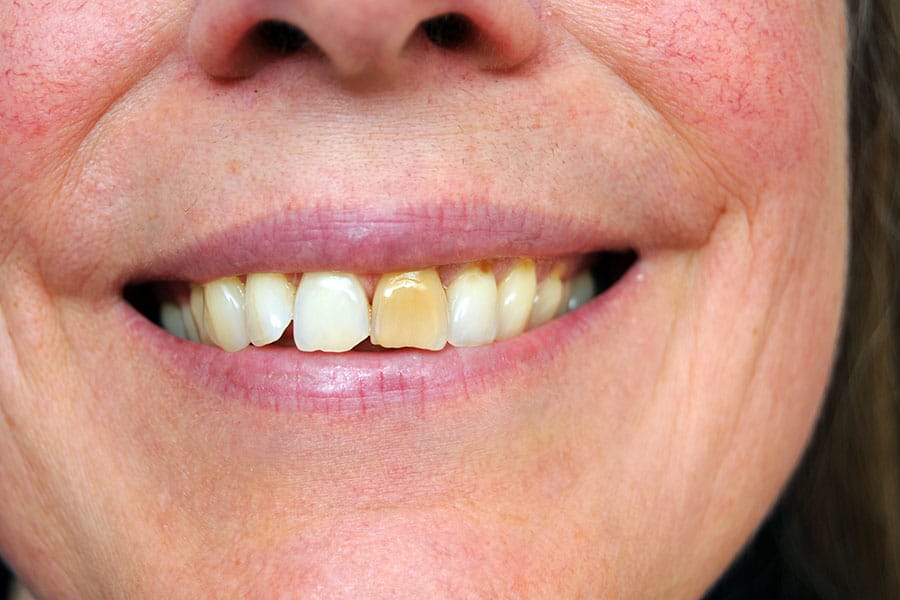When you think of someone with a beautiful smile, they probably don’t have yellowed or stained teeth. Discolored teeth are common, but luckily it is possible to reverse and treat tooth discoloration.
There are two types of stains: intrinsic and extrinsic discoloration. Intrinsic stains are, unfortunately, more difficult to treat. These stains can be caused by tooth decay, medication, oral trauma, and excessive fluoride. Since these stains are located within the tooth instead of on the surface, they typically do not respond to tooth whitening strips and toothpaste.
Extrinsic stains are caused by tobacco products, drinks, and food. These stains, located on the outside of the tooth, affect the tooth enamel, and are much easier to treat. You may be able to enhance your tooth color with OTC whitening products or professional dental intervention if your tooth discoloration is extrinsic.
Causes
Stained teeth causes vary but are most commonly due to lifestyle choices such as what food and drinks you consume and if you use tobacco products. Poor oral hygiene can also have a great effect on the color of your teeth. The following causes should be kept in mind if you want to prevent tooth discoloration or if you are trying to figure out what caused yours in the first place.
Age:
As we age, our enamel can become thinner. When this happens, our teeth may begin to look yellow. Sometimes, stains can start to show because you’re getting older and not because they were caused by age. Stains from coffee, tea, and cigarettes can start to show later in life as your enamel naturally thins.
Food and Beverages:
Food and beverages are two of the biggest culprits for stained teeth. Dark-colored, sugary foods and drinks should be limited to prevent tooth stains. The following may stain your teeth.
- Red wine
- Coffee
- Tea
- Sports drinks
- Fruit drinks
- Brown sodas
- Blueberries
- Cherries
- Dark or acidic sauces such as soy sauce and balsamic vinegar
- Tomatoes and tomato sauce
- Beets
- Popsicles
- Pomegranates
- Candy
Medicine:
Doxycycline and tetracycline can alter the color of your teeth. Specifically, when used before the age of 8 or during pregnancy. Instead of turning your teeth yellow, some medications may result in gray or brown teeth instead.
Blood pressure medicine, antihistamines, and antipsychotics can also have a negative effect. Chemotherapy and radiation exposure may also yellow your teeth.
Dental Hygiene:
Poor dental hygiene can lead to tooth decay and plaque buildup. Brushing and flossing consistently is crucial to maintaining good oral health and preventing tooth stains. See our dentist every six months for a cleaning and check-up as well, as part of your oral care routine.
Cigarettes and tobacco products:
Cigarettes and chewing tobacco can do a lot of damage to your mouth. Not only can tobacco products lead to brown spots on your teeth, but they can also cause cancer. According to healthline media, smokers are more likely to have tooth discoloration than non-smokers.
Medical Conditions:
Experiencing a high fever during childhood or neonatal jaundice that is severe may cause yellow teeth later in life. A calcium deficiency may have an effect as well.
Oral trauma:
For children under 8, oral damage can impact the way their teeth form and lead to discoloration as an adult. However, oral trauma and nerve damage at any age can cause issues. This may be caused by a sports accident, a hard fall, or any traumatic event where the teeth sustained an unusual impact.
Genetics:
Genetics can play a part in tooth discoloration. Sometimes, you may naturally have darker or yellower teeth than others due to no action of your own. There are also genetic conditions such as dentinogenesis imperfecta and amelogenesis imperfecta that may cause discolored teeth as well.
Preventative Tips
It’s easier to prevent stains than to fix them. That’s why prevention is so important, whether you currently have stains and are having them treated or already have a bright, white smile. Consider the following tips to prevent stains from forming.
- Quit drinking coffee, red wine, colas, and tea, or work on limiting your intake. If you love these beverages or can’t do without your cup of joe, drinking water and rinsing your mouth may help, at least until you have a moment to brush and floss your teeth.
- Have your teeth cleaned professionally every six months unless your dentist recommends otherwise. Regular dental cleanings can prevent discoloration.
- Engage in good oral hygiene habits. Make it a habit to floss every day, brush your teeth twice a day, and use mouthwash every day too. Using a whitening toothpaste or mouthwash can tackle stains preemptively before they set in deeper, too.
- Put an end to habits such as smoking and using tobacco. We know this one can be tough for anyone using these products, but it will not only benefit your oral health but be great for your overall health as well.
Stained Teeth Treatments
You don’t need to worry if your teeth are already stained, as there are treatments available that can help reverse discoloration.
Consider whitening toothpaste, strips, and other whitening products as your first line of defense. If these at-home products do not help you, the next step may be professional teeth whitening performed by our dentist.
For teeth that are deeply stained and do not respond to whitening treatments, dental bonding, veneers, or crowns may be an option. However, because these are costly options, most patients try whitening options first.
Keep in mind; if you have dental bonding, crowns, or veneers, you will need to change your habits post-procedure. This is because dental restoration options cannot be whitened once placed. Limiting beverages that stain, tobacco use, and maintaining good oral hygiene are vital habits to establish.
If you’re ready to brighten your smile, you can call us at 480-838-3033 to schedule an appointment with our dentist today!

